Course Content

John Wilks
Studies commence at 9.30 a.m. and finish at 5.30 p.m.
- Settling exercise – an understanding of the importance of practitioner fulcrums and being present for your client (PRACTICAL)
- Developing the kind of sensitive touch as used in Craniosacral therapy (PRACTICAL)
- Overview of the history and development of Craniosacral therapy and Cranial Osteopathy
- Explanations of the 3 major ‘tides’ that can be felt throughout the body
- Palpation of the Cranial Rhythmic Impulse at the sacrum (PRACTICAL)
- Trust & safety in the therapeutic setting – negotiation of touch (PRACTICAL)
- Trauma – what it is and how to work with it both from the Craniosacral perspective and with other therapies
- Stillpoints – what they are and how to feel them and encourage them. An explanation of CV4 and EV4
- Stillpoints at the occiput (PRACTICAL)
- Explanation of the Mid-tide and potency
- Palpation of the mid-tide at the head (PRACTICAL)

John Wilks
- A brief overview of the ‘Social Nervous System’ the vagus and the polyvagal theory
- An overview of various Craniosacral holds (PRACTICAL)
- Transverse relationships in the body and how to palpate them
- Palpation of the diaphragm (PRACTICAL)
- Palpation of the atlas, axis and occiput (PRACTICAL)
- Understanding dural tube connections between the sacrum and the neck and occiput
- Palpation at the lumbar and thoracic spine (PRACTICAL)
- Assessing levels of vitality with clients through palpation of cranial rhythms (PRACTICAL)
- Presentation on the temporal bones and palpation of them (PRACTICAL)
- Palpation of individual joints – knees and shoulders (PRACTICAL)
- Palpation at the feet (PRACTICAL)
- Explanation of the Long Tide in relation to fascia
- Palpation of superficial and deep fascial layers (PRACTICAL)
- Overview of the Cranial nerves and how they can be affected by nerve entrapment in the cranium and neck. A discussion of potential symptoms.
- Discussion of treatment strategies as a result of palpation felt (PRACTICAL)
- Integrate palpations and assessment into a treatment plan (PRACTICAL)
Many Associations accept our courses for CPD including the IFPA (12 Category A Points).
 Accredited school
Accredited school

